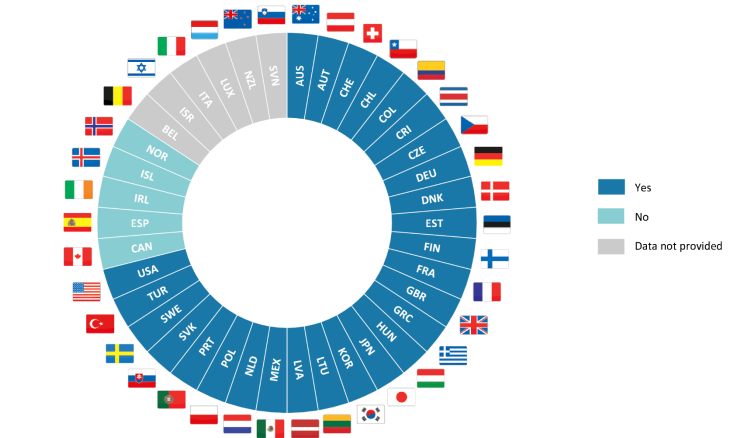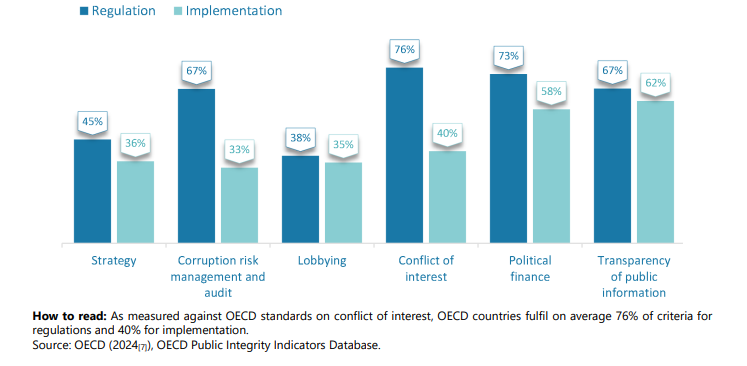Public integrity refers to the consistent alignment of, and adherence to, shared ethical values, principles and norms for upholding and prioritising the public interest over private interests in the public sector.
Public integrity indicators
The OECD Public Integrity Indicators focus on actionable criteria to support anti-corruption initiatives, compare performance and identify good practices. The objective, evidence-based and actionable data helps decision-makers understand the strengths and weaknesses of national anti-corruption and public integrity systems, better allocate resources, and target specific challenges.
Key links

Key messages
Almost half of those surveyed in the 2021 OECD Trust Survey believed that a high-level political official would grant a political favour in exchange for the offer of a well-paid private sector job.
Context
Most OECD countries have a strategic approach to corruption, and two-thirds of the planned activities are implemented in practice.
In recent years, OECD countries have intensified efforts to develop a strategic approach for mitigating corruption risks. Since, 2020, many OECD countries have developed an anti-corruption or integrity strategy for the first time, and 71% of OECD countries now have a strategy in place.
Yet monitoring, evaluation and implementation of strategic frameworks needs to be improved. On average across all OECD countries that have an anti-corruption and integrity strategy, of the countries which collect this information, 67% of planned activities are implemented in practice.
OECD countries with a strategic approach to mitigate corruption risks

Regulations on anti-corruption are becoming more comprehensive and sophisticated, but considerable implementation gaps remain.
Across the OECD, key gaps in regulations remain: for example, lobbying regulations are particularly underdeveloped, or non-existent, in many countries. Likewise, implementation remains a challenge in some areas, with regulations on corruption risk management and audit the least implemented.
While more countries are adopting strategies to curb corruption, they still mainly focus on actions to promote integrity in the public sector, not the private sector, and fail to adapt to newer integrity risks.
Strength of regulations and their application in practice

OECD Public Integrity Indicators Portal
The OECD Public Integrity Indicators establish a new benchmark for government resilience to corruption risks and for strengthening public integrity. Based on primary data sources and validated by countries, the Indicators help bolster global efforts against corruption by providing actionable data. The portal currently features data on the quality of public integrity and anti-corruption strategies.
Latest insights
-
 oecdecoscope.blog26 August 2022
oecdecoscope.blog26 August 2022
Related publications
Related policy issues
-
The Working Party on Export Credits and Credit Guarantees has combatted, for many years, bribery in international business transactions. The current disciplines are contained in the Recommendation of the Council on Bribery and Officially Supported Export Credits (Recommendation), adopted by OECD Council on 13 March 2019.Learn more
-
Clean, efficient and competitive businesses that operate with integrity help to ensure healthier markets and greater investor confidence. Recognising that businesses and C-Suite leaders are at the pointy end of putting integrity into practice, the OECD provides guidance to the business sector on designing stronger internal controls, ethics and anti-corruption compliance programmes and to governments on promoting and incentivising integrity in the business sector.Learn more
-
Preventing and managing conflicts of interest in the public sector is crucial to help governments strengthen and enhance public integrity. Left undetected or inappropriately managed, they can undermine the integrity of public officials, decisions, agencies and governments. If conflicts of interest are left unresolved, they may ultimately lead to private interests capturing the policy process.Learn more
-
The fight against foreign bribery requires the concerted efforts of a unified front. The OECD fights bribery in international business transactions to strengthen development, reduce poverty and bolster confidence in markets and governments.Learn more
-
Robust internal control and risk management systems are essential for upholding public integrity. Effective frameworks reduce the vulnerability to fraud and corruption by providing reasonable assurance that the organisation is achieving its objectives and managing risk. These policies help to ensure value for money by ensuring governments are optimally delivering programmes. They balance an enforcement-focused model with a risk-based approach.Learn more
-
A wide range of stakeholders should have a fair and equitable opportunity to contribute to public decision-making, allowing policymakers to decide on the best course of action on any policy issue. Public decision-making however may at times only consider the interests of a few, and undue influence can also be exercised through opaque or deceptive means rules on lobbying and influence need to reflect new realities, including rapid technological change, and influence on behalf of foreign state actors, and respond to calls for increased transparency, integrity, and access.Learn more


